UK film and TV: 'Expect lots of dramas in space or under the sea'
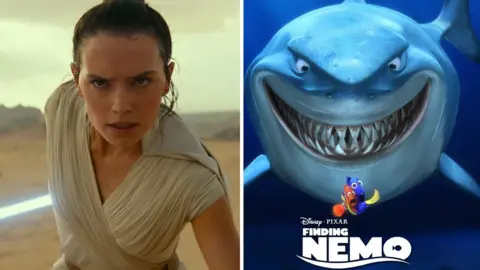 Lucasfilm/Pixar
Lucasfilm/PixarBig changes to working practices in the UK film and TV industry will soon be reflected on our screens, say a leading producer, screenwriter, and union leader.
Emmerdale, one of the popular shows which has been stalled since March due to the Covid-19 pandemic, started its "phased return to filming" this week, adhering to strict new social distancing guidelines on episodes showing characters dealing with lockdown.
The new era will pose great "challenges", according to Pact union boss John McVay, but he's backing his colleagues to "creatively rise" to them, and continue to be "ambitious" and "innovative" in their approach.
"We will have to creatively change what we're doing," says McVay, whose organisation represents 550 independent TV, film and creative companies.
"If you've got a scene for EastEnders and everyone is in Albert Square celebrating someone's birthday... you couldn't really do that [now]. So these are physical production, business and creative challenges that we're going to have to navigate."
"I would think, looking forward, on soaps you might have a lot more scenes where there isn't a huge party, but maybe a singular storyline about some single parent," he adds.
'Locked-in and locked down'
While soaps will have to adapt, and current affairs shows have had to muddle through using video conferencing software; bigger-scale productions will be even harder to pull off in the brave new world.
Screenwriter and author Ewan Morrison, who has worked on scripts for recent dramas like Netflix's The Outlaw King, as well as Cold Call, and American Blackout, thinks that smart filmmakers should now be thinking about making things that "won't involve exterior locations and casts of hundreds".
And that TV producers would also be wise to favour shows filmed in "locked-in and locked down studios", or in "remote locations".
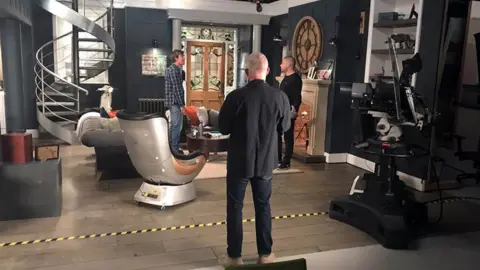 ITV
ITV"So, expect to see a lot of dramas in the next year that are shot in deep space, under the sea, or in surreal closed environments - like remote islands," the RTS Award-winner predicts.
"It's ideal for horror films like The Platform, Cube, and Saw.
"And, of course, animations can now be done from home, so expect to see a renaissance in big-budget animations".
'Like moving an army'
Also being done from home right now is post-production on series four of The Crown, after filming was safely "in the bag" before the crisis, producer Andy Harries tells the BBC.
Harries says he's "not convinced" though that it will be possible to properly film big television dramas in a socially distanced manner, as they are akin to a military operation.
"It's very difficult to put a large film crew together with a large bunch of actors, moving it around locations," he says.
"It's like moving an army around and you can't move an army around two metres apart for every single person."
The film boss, who acknowledges that British crews are "anxious to get back to work", admits he doesn't think filming, as they know it, will be possible again until "some sort of cure or vaccine is available".
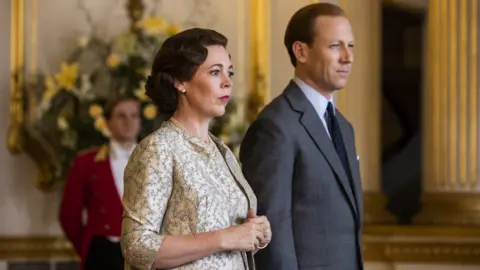 Netflix
NetflixHis Left Bank Pictures team are currently working out exactly how to film the screen adaptation of the Robert Harris novel, The Fear Index, which they've already decided will now have to move from Europe to London.
The story involves a married couple, which has begged the question, "how do you get [on-screen] intimacy in the 'new normal' that is plausible?", Harries adds.
"You don't want in a year's time to watch a drama after this is all over and go, 'that's a bit ridiculous, they're not even kissing, they are miles apart!' - it's tricky".
'Concerns about insurance'
Then there's the even trickier issue of coronavirus insurance, or the current lack there of, which Harries and McVay agree is a major obstacle to production, along with feeding and transporting crews to and from set.
A government DCMS spokeswoman told the BBC it was, "working closely with the screen sector to understand the full extent of concerns about insurance and explore ways they can be effectively addressed".
Most independent production companies, McVay notes, operate with enough savings to sustain themselves for three to six months without work and are therefore "nervous" that that money will "burn out in the end", particularly in the event of a second spike/lockdown.
As a leading contributor to the UK economy, the film and TV industry should be given research and development tax credits, he claims, both for now, and to help them to have world class "ideas ready for when the market comes back".
"We have some of the best technical crew, the best actors, the best writers, the best directors," adds McVay.
"All of that is a wonderful happy accident, which somehow has happened in the UK over the past 20-odd years and we don't want to pull back from that as that's been a hard fought-for position."
'Marvel and the BBC'
One such talent, Morrison, is fearful, however, that a move to "increased statism" in both politics and in culture-making, in the wake of the virus, will "cull about half the small TV and film production companies", and lead to far less bold and original content being made.
Cinemas in Japan reopened last week showing classics like Ben-Hur, Wizard of Oz, and Blade Runner, after many filmmakers delayed their latest releases, in response to the crisis, or debuted them online.
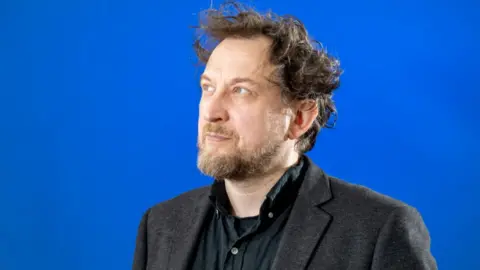 Getty Images
Getty Images"Unfortunately, because everyone's finances are now much more endangered and stretched, I can imagine we'll see a lot of conservatism within programme commissioning choice, and very little risk-taking," says Morrison.
"There's just not any spare money around to take risks, so we'll be seeing even more remakes and safe names."
"We're going to end up with the only two monetisable forms of culture," he goes on. "Corporate-funded Hollywood franchises, and state-funded culture, funded by printed money".
In other words: "We're going to have Marvel, and the BBC... Super capitalism and super estate."
It's perhaps no surprise that during lockdown, films about fictional viruses like Contagion and novels like Albert Camus' The Plague have become more popular, as people try to get their heads around the current situation.
Morrison, whose work - including the recent Scottish fiction book of the year-winner, Nina X - touches on themes of control, freedom, utopia and globalisation; finds it reminiscent of dystopias such as 1984 and Farenheit 451, where "over-powerful states control language and behaviour".
The much-talked about Chinese social credit score system, and the contact tracing app soon to be rolled out in the UK to help stop the spread, also remind him of the Black Mirror episode Nosedive; set in a world where people rate each other for every interaction they have, which then has an impact on their socio-economic status.
On the plus side, he suggests, an extended period in quarantine will have have permitted "people who are usually working for 'The Man' to be creative for themselves", leading to potential new crop of British stars, as well as a "super abundance of free culture" online.
But that phase will be short lived, he envisages, and they won't necessarily be stars of the screen.
"Poetry, painting, music, these things will thrive, but art forms that require vast amounts of capital, like film and TV, won't be open to this abundance of new talent".
'Don't write us off'
McVay describes the pandemic as the "worst experience" in his 40-odd years in the business, but he's hopeful that new UK-made programmes and films will continue to thrive.
He cites BBC Three's recent drama Normal People, which was produced in Ireland by Element Pictures, as an example of "great content" that has mattered to people at this difficult time.
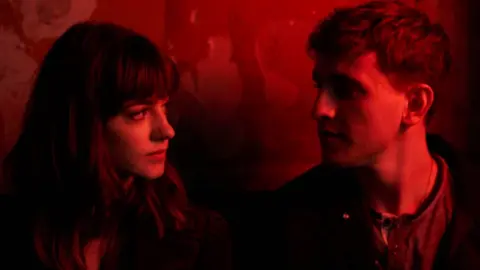 BBC/Element/Enda Bowe
BBC/Element/Enda BoweAs well as continuing to bring us news and features about all things virus-related, he hopes the nation's "resourceful" content makers will find ways around restrictions and come up with some "great British comedy and things that aren't about Covid-19".
"Don't write us off," he warns. "I have a lot of confidence in the ingenuity and creativity of the people in the UK.
"We want to makes things and we'll find ways to do it."
